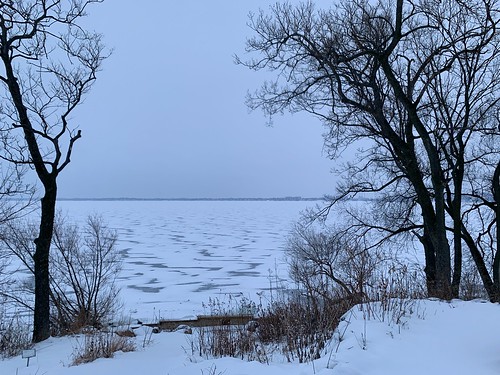Loading...
Title : Thanks for not breaking our heart.
link : Thanks for not breaking our heart.
Thanks for not breaking our heart.
I set out in the snow to do my sunrise run, and I made it to my vantage point, which looked like this:No sun to see. 100% overcast. And the snow wasn't stuck to the trees, so no "winter wonderland" effect. Just deep snow on the ground, making the run something of a trudge. But as I approached my vantage point, down along the shore, I saw a man and woman up ahead, and they'd slowed down and were slowing stamping about.
I had to overtake them, and my normal method is to get as far to one side of the path as I can, but I took an even wider path around them because I saw that they had stamped out a big heart that stretched the whole way across the path. That's what they'd been doing up there, making a heart the size of a queen-size bed out of footprints in the snow. I was, of course, super-glad that I saw it and went up and around it, and they were too.
We exchanged a smiley greeting and the man said something, maybe "Thanks for not breaking our heart!"
I didn't hear what he's said because I had my earbuds in. I was listening to the audiobook "The Ministry of Truth/The Biography of George Orwell's 1984," and the passage was, coincidently, on the subject of coupled-up love. It was about the dystopian novel "We" by Yevgeny Zamyatin:
The novel he started writing in Petrograd in 1920, at the age of thirty-six, is set hundreds of years in the future, in the ultra-rational despotism of the One State, a hyperbolic expression of the author’s belief that urban life “robs people of individuality, makes them the same, machinelike.” Zamyatin hones and develops ideas from Wells and Dostoevsky into a sturdy template for numerous tales of individualism versus homogeneity. In the shape of the Benefactor, Zamyatin gives us the mysterious, nameless dictator who poses as a protector. He gives us uniformed “ciphers” with numbers instead of names, and a state which represents “the victory of the many over the one.” He abolishes privacy by installing his ciphers in glass houses, constantly monitored by the secret police (“the Guardians”), except during the state-mandated “sex hour,” which, in a world without love, is organised via a ticketing system.
Loading...
I set out in the snow to do my sunrise run, and I made it to my vantage point, which looked like this:

No sun to see. 100% overcast. And the snow wasn't stuck to the trees, so no "winter wonderland" effect. Just deep snow on the ground, making the run something of a trudge. But as I approached my vantage point, down along the shore, I saw a man and woman up ahead, and they'd slowed down and were slowing stamping about.
I had to overtake them, and my normal method is to get as far to one side of the path as I can, but I took an even wider path around them because I saw that they had stamped out a big heart that stretched the whole way across the path. That's what they'd been doing up there, making a heart the size of a queen-size bed out of footprints in the snow. I was, of course, super-glad that I saw it and went up and around it, and they were too.
We exchanged a smiley greeting and the man said something, maybe "Thanks for not breaking our heart!"
I didn't hear what he's said because I had my earbuds in. I was listening to the audiobook "The Ministry of Truth/The Biography of George Orwell's 1984," and the passage was, coincidently, on the subject of coupled-up love. It was about the dystopian novel "We" by Yevgeny Zamyatin:
The novel he started writing in Petrograd in 1920, at the age of thirty-six, is set hundreds of years in the future, in the ultra-rational despotism of the One State, a hyperbolic expression of the author’s belief that urban life “robs people of individuality, makes them the same, machinelike.” Zamyatin hones and develops ideas from Wells and Dostoevsky into a sturdy template for numerous tales of individualism versus homogeneity. In the shape of the Benefactor, Zamyatin gives us the mysterious, nameless dictator who poses as a protector. He gives us uniformed “ciphers” with numbers instead of names, and a state which represents “the victory of the many over the one.” He abolishes privacy by installing his ciphers in glass houses, constantly monitored by the secret police (“the Guardians”), except during the state-mandated “sex hour,” which, in a world without love, is organised via a ticketing system.
Thus articles Thanks for not breaking our heart.
that is all articles Thanks for not breaking our heart. This time, hopefully can provide benefits to all of you. Okay, see you in another article posting.
You now read the article Thanks for not breaking our heart. with the link address https://welcometoamerican.blogspot.com/2021/01/thanks-for-not-breaking-our-heart.html

0 Response to "Thanks for not breaking our heart."
Post a Comment